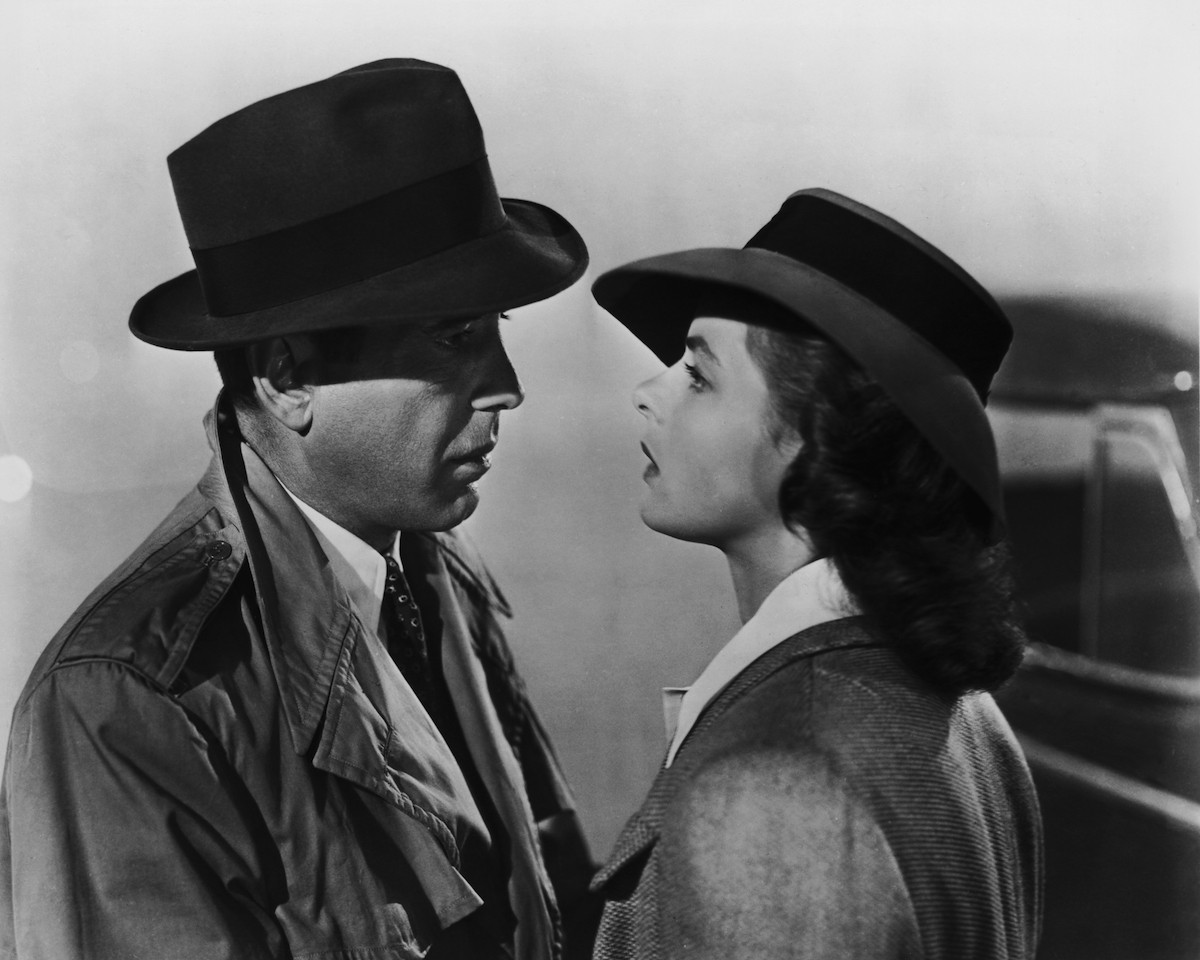
Humphrey Bogart as Rick and Ingrid Bergman as Ilsa in Casablanca
Kim Vodicka released her third book of poetry, The Elvis Machine, earlier this year. Her sharp verses veer between the cynical and romantic, dissecting love in the connected age. She had never seen Casablanca, the 1942 film considered to be one of the greatest romances of all time. Our conversation has been edited for length and clarity.
Chris McCoy: So what do you know about Casablanca?
Kim Vodicka: So, black and white, 1940’s, Lauren Bacall, Humphrey Bogart. “Here’s looking at you, kid.” I don’t know the context of that line. I assume it’s Bogey talking to Bacall, hitting on her or flirting with her, but I really, I have no idea.
Chris: It’s Ingrid Bergman, not Lauren Bacall.
Kim: Okay. So yeah, I really know a surprising amount of nothing about this movie.
Never Seen It: Watching Casablanca with Poet Kim Vodicka (2)
102 minutes later…
Chris: Kim Vodicka, you are now a person who has seen Casablanca. What did you think?
Kim: I liked it. It was somewhat difficult to follow, maybe at first. I’m kind of bad with history stuff. The love story…I think my impression of it going into it was that it was going to be more powerful. It didn’t move me as much as I thought it would. However, I LOVE the end! I was basically on Team Laszlo the whole time. It seems just a little unbelievable that she would consider staying with this dude that she just had kind of a fling with in Paris, really. But there’s also a suggestion that maybe her claiming to still be in love with him was a sham the whole time. Not in Paris, but in Casablanca, when they reunite. But I guess the deal is that they actually were in love. I feel like they kind of leave it somewhat open to interpretation there, but the commonly accepted thing, I guess, is probably that they were still in love.
Chris: Casablanca was shot in the fall of 1942. America had been in the war for less than a year at that point. All the people who are in Ricks, the refugees, many of them were actually refugees. That’s why all the bit parts are so good, because those people were European movie stars who had fled Nazi Germany. Conrad Veidt, who plays Major Strasser, was a big star in Germany. Peter Lorrie, who was Ugarte, was the murderer in M, one of the masterpieces of German expressionist cinema. And a lot of those people would go on to have huge careers because of Casablanca.
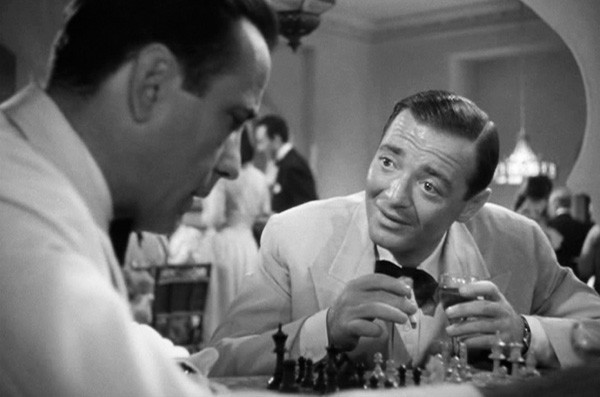
Peter Lorre (right) as Ugarte, the ill-fated human trafficker.
Kim: I feel like I was expecting like a tear jerker, but it wasn’t really pulling my heart strings really in that way. But it definitely gave me chills, like in a lot of different places, for reasons that are difficult to explain, but not just because of the story. For whatever reason, the love story felt somewhat…it’s not like it was implausible, but the fact that they admit that they didn’t really know anything about each other, yet were so in love. I just feel like I don’t relate to that.
Chris: I think one of the things that made it hit so hard at the time is that there were people in this situation. This was not an implausible story. I mean, it’s contrived—it’s Hollywood, you know? But there literally were a lot of couples who’d been separated by the war. And then at the end, when, when he sends her off on the plane…well, there were a lot of people sending their boyfriends and girlfriends off on planes, you know? There were a lot of situations where people had like brief, but intense, flings, because it was like, “This is the end of the fucking world.”
Kim: Well, I kept thinking about it in terms of now, and I was like, wow.
Chris: It was a moment when democracy was in crisis, when the democracies of Western Europe had fallen. I don’t know if you caught the Vichy thing, but when the Germans occupied France, the capital was no longer Paris—it was Vichy. That’s why Captain Renault was like, “I blow with the wind, and right now, the wind blows from Vichy.” And then at the end, when Renault has the Vichy water, which is Vichy’s famous product, sparkling water. He looks at the, at the label, he’s like, oh, it’s from Vichy. And he throws it in the trash can.
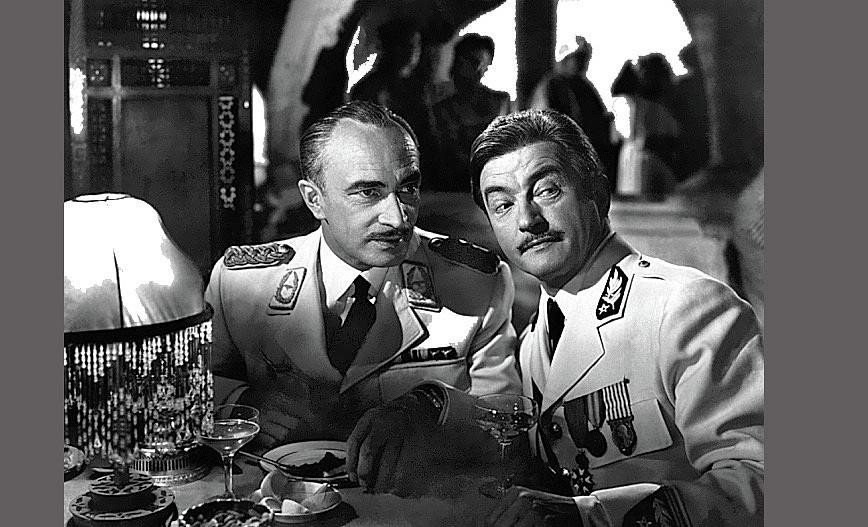
Conrad Veidt as Major Strasser and Claude Rains as Captain Louis Renault. Veidt, a refugee from Nazi Germany, made a Hollywood career out of playing villainous Nazis.
Kim: That was like one of my favorite parts! At the very end, the guy who’s playing both sides the whole time is like, yeah, I’m finally a good guy. I thought the love story, or the relationship, between Ilsa and Laszlo was totally fucking amazing and powerful. I just wasn’t buying the Paris fling was Bogey. It wasn’t registering emotionally with me.
Chris: The dig on Paul Henreid, who is Laszlo, is that he is kind of wooden and stiff.
Kim: I guess that says a lot about me.
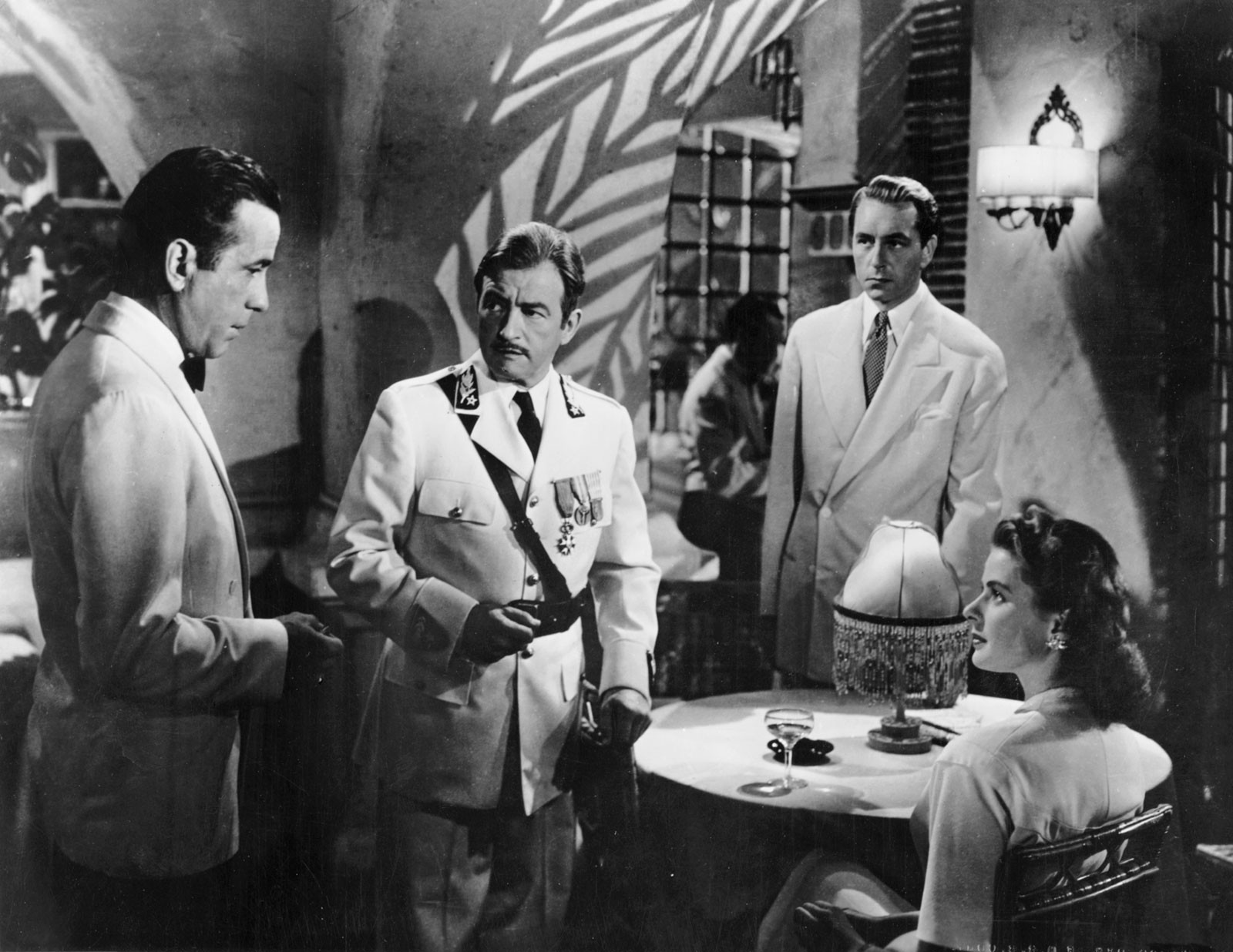
Rick Blain (Humphrey Bogart), Captain Renault (Claude Rains), Victor Lazlo (Paul Henreid), and Ilsa Lund (Ingrid Bergma) meet in in Rick’s Café Américain.
Chris: No, it’s totally legit. I think it’s really interesting, because, from a societal point of view, she has to end up with him. Rick and Ilsa have an adulterous relationship, even though they didn’t know that it was, because she thought Laszlo was dead. The moral structure of it is that both of those relationships are legitimate relationships. But she has to go with Laszlo, because they’re married.
Kim: Why would she even consider leaving Laszlo? He’s like a total gangster.
Chris: He’s a journalist.

Paul Henreid as Victor Laszlo
Kim: I really, really enjoyed it. I feel like I need to watch it again. One of my favorite movies is Chinatown, which has a very convoluted plot. And that’s a movie where I’ve seen it so many times, but it’s almost like I see a new thing in it every time. This is maybe not quite that level of complexity, but I definitely need to watch it at least one more time, because it was moving quickly, and sometimes my brain just works a little differently.
Chris: It moves really quickly. And it’s still, to this day, a fast mover.
Kim: Especially when I’m not super brushed up on my history.
Chris: This would have been like making a movie about 9/11 in 2002, right before the Iraq War.
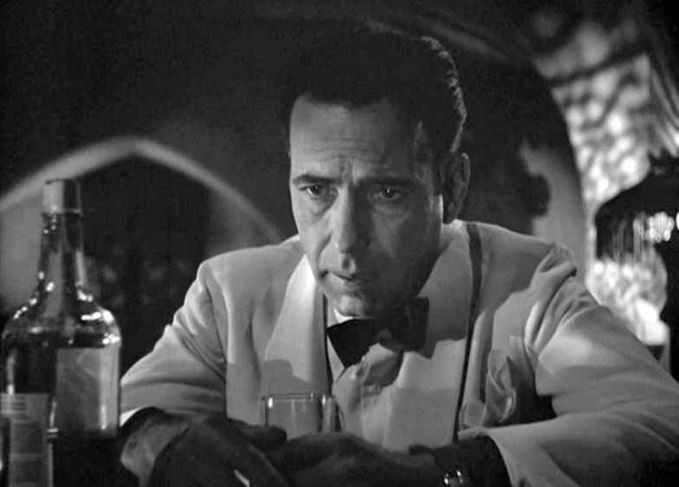
Rick waits for Ilsa.
Chris: Humphrey Bogart is one of the greats. He suffers better than anybody. Especially when he’s in the closed bar, waiting for Ilsa to show up.
Kim: And he’s like, “Play it, Sam. Play it!”
Chris: And Sam, of course, is the voice of reason throughout the entire thing. Everything Sam says is right. He’s like, “No, you should just let it go. Don’t get in the middle of this. She’s nothing but trouble for you.” Yeah. That’s exactly right. But then, Rick would never become a hero.

Dooley Wilson as Sam, the piano player at Rick’s Cafe Americain.
Kim: I love the part in the casino, at the roulette table, after the younger girl talks to him about wanting to leave with her lover and he’s basically like, trying talk her out of it. But then, all of the sudden, he goes and helps the dude win the money they need to get their visas. I thought that was cool.
Chris: So what’d you think about Ingrid Bergman?
Kim: One of the things I couldn’t stop thinking about is, she’s Isabella Rossellini’s mom, right?
Chirs: Yes.
Kim: I kept thinking about that so much throughout. I love Isabella Rossellini, and I’m a huge David Lynch fan. So I’ve seen Blue Velvet like 7,000 times. So I found myself fascinated by comparing like their facial features. And I find the way they, like, their elocution is strange and similar. But, yeah, she was great. Her eyes…those sparkling eyes!
Never Seen It: Watching Casablanca with Poet Kim Vodicka (4)
Kim: “Here’s looking at you kid,” that happens three times. I was surprised by that. I thought it was just like the one and done, but it’s like their thing.
Chris: It functions differently each time.
Kim: Yeah. Because at first, they don’t want to talk about their past. So he’s like, “Here’s looking at you!” And then the next time, she didn’t want to think about the present.
Chris: The last time is when he’s trying to convince her to go with Victor. It’s what puts her over the top, I think.
Kim: Yeah. The end is just so great.
Chris: I’m glad that you like Chinatown. When you learn screenwriting, they teach both of those scripts. Because everything works within itself. You have little conflicts and emotional payoffs. And in every scene, there’s something that connects to the neighboring scenes, before it and after it, and then there’s something that connects with some other scene in the movie. There’s big structure, and there’s small structure. Everything that seems like a random detail in the first half turns out to be a setup for something in the second half.
Never Seen It: Watching Casablanca with Poet Kim Vodicka (5)
Chris: So what do you think it feels contemporary? Do you think that it has something to say for today?
Kim: I couldn’t help, but think of how politically scary things are now. Things are very different, but it’s been about 80 years since World War II or thereabout, and it’s just interesting to me how history repeats itself. It doesn’t even feel like something that happened so long ago, It isn’t the same, of course, even though it sort of is the same human behavior in action. It really feels like at any point now the world could start going in a similarly awful direction. I think a lot of people are feeling that, and I’m trying to talk about this without going into too much of an extremist version. But here’s a lot of panic and fear. I’m trying to avoid dialing into that here. However, I think that there are good reasons to be afraid, and I could not stop thinking about it while watching Casablanca.
Chris: The Nazi occupation seems a little bit more immediate now, I think, than it has ever has before. I totally got that this time. And the fascists, they always act the same. There are different languages and different faces on it, but they all act the same.
Kim: I loved when the Nazis are singing their national song, and they kind of take over the bar, and then Laszlo stands up and starts singing, uh…
Chris: “La Marseillaise”.
Kim: Yeah. And then everyone else starts singing along, and they drown out the Nazis.
Never Seen It: Watching Casablanca with Poet Kim Vodicka (3)
Chris: It’s like a rap battle. This movie is one dance number from being a musical. Did you notice that?
Kim: Yep. That would be interesting.
Chris: Especially at the beginning, when you’ve got so much Sam, who was played by Dooley Wilson. He was a musician. He had a career. People knew him. It would be like having Drake sing in your movie.
Kim: I got that impression, even though I did not personally recognize him. I got the sense that he must’ve been famous in the time.
Chris: So it’s like, here’s a song, and then here’s one of the most efficiently constructed scenes you’ve ever seen in your life. And then here’s another song. So there’s tension, and then you release it with a song. But that only happens in the beginning. As it goes on, towards the end, the music goes away. And that really ratchets up the tension.
Kim: There’s a lot of that kind of play with extremes. It was really interesting to see the flashback scene and how Bogey’s character is like a chiaroscuro, you know? Cause he’s this curmudgeonly, beleaguered, cynical dude, and then you see him how he was before. And it’s such a transition. It also shows his incredible range as an actor. Really, really cool.
Chris: It’s subtle. It’s not like he’s like jumping up and down and going, “I’m so happy with you, Ilsa!” He’s just a little looser in his body language.
Kim: Exactly.
Chris: And he smiles when he looks at her, too. He doesn’t smile at all through the rest of it. He suffers better than anybody.
Kim: He’s like, pulling some Hamlet shit.
Never Seen It: Watching Casablanca with Poet Kim Vodicka (6)
Chris: To show you how well constructed it is, there’s one major thing that absolutely falls apart if you think about it too hard: The letters of transit. Really, the Nazis could have just grabbed Ilsa and Laszlo at any time. They didn’t recognize laws if it they got in their way. And just because they have these letters of transit, it doesn’t mean they’re going to allowed to go on the plane. In fact, it takes Rick basically nuking his life to get them on the plane. But you don’t think about, because goes by so quick, and nobody questions it.
Kim: Right. I was actually starting to feel like something really bad was going to happen towards the end, which I guess they’re kind of setting you up for that. Like maybe their plane was going to get like shot down or something.
Chris: It says a lot that you were willing to go there in your mind, you know what I mean? There’s a lot of times when a movie would be like, “Oh, that’s the star. Nothing’s going to happen to them.” But by the time you get to the airport, you’re like, “Man, they could really kill Bogey.”
Kim: This is all the 2020 up in here. We’ve had movies like No Country for Old Men, where like, that’s like perhaps the most shocking death ever. Heroes can die. We’re in a completely jaded, cynical world at this point. So that’s the world that I’m living in, I guess.
Chris: Yeah, it is a cynical world, but one of the things this movie is about is overcoming cynicism. That’s Rick’s whole arc. He’s cynical and neutral, because he’s had his feelings hurt. He’s got to get where Laszlo is. “The problems of three little people ain’t worth a hill of beans in this world.” I think it still feels very relevant, because I think that’s what we need to do right now. It’s about overcoming cynicism and overcoming fear, too.
Kim: Yeah. There was a lot of hope, and there’s faith in the good of humanity that I was getting out of it out of watching the movie, which was nice to feel. We don’t get enough of that.
Never Seen It: Watching Casablanca with Poet Kim Vodicka